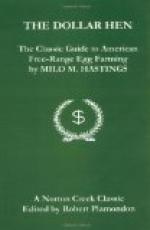If the loss off buyer feels he is losing business, he may instruct his candler to grade more closely, which means he will pay less. Whether done with honest or dishonest intention, the buyer thus sets the price to be paid after he has the goods in his own hands, and this is an obviously difficult commercial system.
Where the buyer in one case changes the grading basis to protect himself, there are probably ten cases where the eggs really deserve the loss charged; but the tenth chance gives the seller an opportunity to nurse his loss with the belief that he has been robbed by the buyer. Such an uncertain feeling is disagreeable, and the results are that where one or two competing egg dealers buys loss off, and the other case count, the case count man will get most of the business.
The case count method being the path of least resistance, the loss off system can only succeed where there is some factor that overcomes the disinclination of a shipper to let the other man set the price. This factor may be: 1st—An exceptional reputation of a particular firm for honesty and fair dealing. 2d—Exceptional opportunities for selling fancy goods, enabling the loss off buyer to pay much higher rates for good stuff. 3d—A condition that prevails in the South in the summer, where the losses are so heavy that the dealers will not take the risk involved in case count buying. 4th—Some sort of a monopoly.
A monopoly for enforcing the loss off system of buying has been brought about in some sections of the West by agreement among egg dealers. In such cases the usual experience has been that some one would get anxious for more business, and begin quoting case count, the result being that he would get the business of the disgruntled shippers in his section. When one buyer begins quoting case count, the remainder rapidly follow suit and case count buying is quickly re-established.
The City Distribution of Eggs.
In name, city egg dealers are usually commission houses, but in practice the majority of large lots of eggs are now bought by telegraph and the prices definitely known before shipment.
In the larger cities eggs are dealt in by a produce board of trade. Such exchanges frequently have rules of grading and an official inspector. This gives stability to egg dealing and largely solves the problem of uncertainty as to quality, so annoying to the country buyer. In the city even, where official grading is not resorted to, personal inspection of the lot by the buyer is practical, and one may know what he is getting.
In many cases, especially in smaller cities, the receiver is the jobber and sells to the grocers. In larger cities the receiver sells to a firm who makes a business of selling them to groceries, restaurants, etc.
The jobber grades the eggs as the trade demands. In a western city this may mean two grades—good and bad; in New York, it may mean seven or eight grades, and the finer of these ones being packed in sealed cartons, perhaps each egg stamped with the dealer’s brand.




